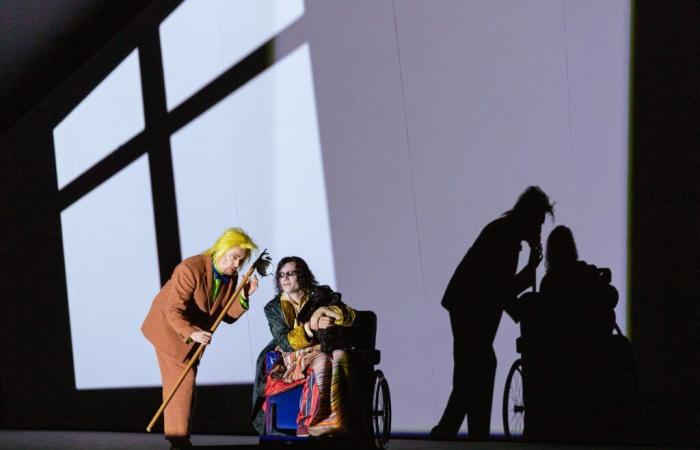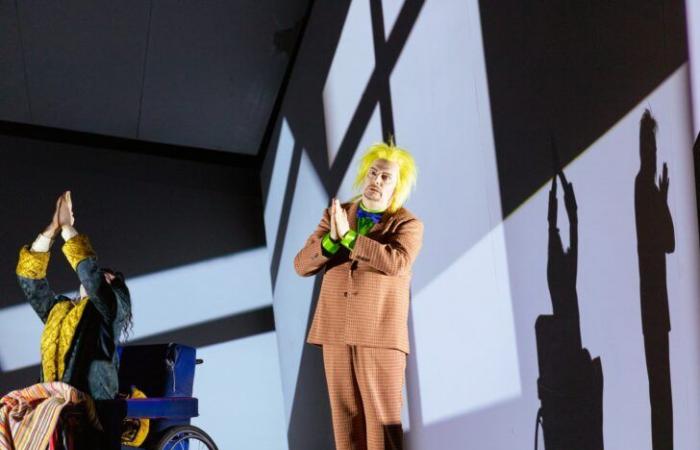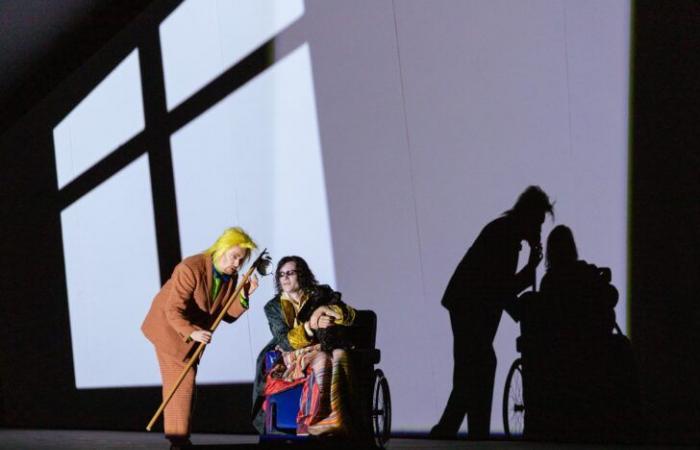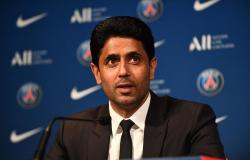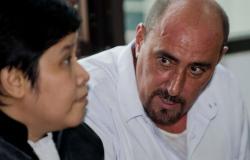More details
Vienna. Staatsoper. 29-X-2024. György Kurtág (born 1926): Endgame, based on the play by Samuel Beckett. Direction, set and costumes: Herbert Fritsch. With Charles Workman (Nagg), Hilary Summers (Nell), Philippe Sly (Hamm), Georg Nigl (Clov). Vienna Opera Orchestra; direction: Simone Young.
For this new production of End of gameSimone Young gives color to the orchestra, but her preparation of the singers does not go to completion.
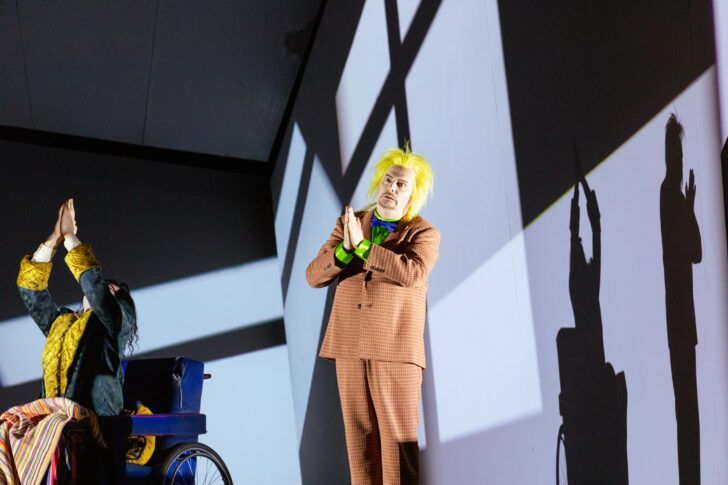
Contemporary opera definitely works: after its creation in Milan and the tour of Pierre Audi's inaugural production, which took place in Paris, among others, End of game by Kurtág is already in its third production, after a few performances in Dortmund and pending a fourth production in January in Berlin.
The Vienna Opera seemed to have had a very good idea in entrusting this show to Herbert Fritsch, director-set designer-costume designer adept at bright colors and the most unbridled comic gestures, to highlight the comedy of the piece, at the place of the sad end of the world drawn by Pierre Audi. Fritsch certainly does better than his predecessor in directing actors, even if Clov, the only mobile character, benefits much more than Hamm in his armchair, and especially than the parental couple: Fritsch gives a more abstract form to the famous trash, but we can't say that it offers anything to replace the rotten poetry of the original piece. He refuses any color to the decor, whose box shape is a little too consistent with tradition, and the fact that the walls and ceiling move apart at times is not really significant. On the contrary, there is color in the costumes, but with an unusual restraint for him, as if he were constantly keeping his theatrical gluttony in view. We will therefore still be waiting for the director who dares to free himself from the stage constraints prescribed by Beckett and his disciples.
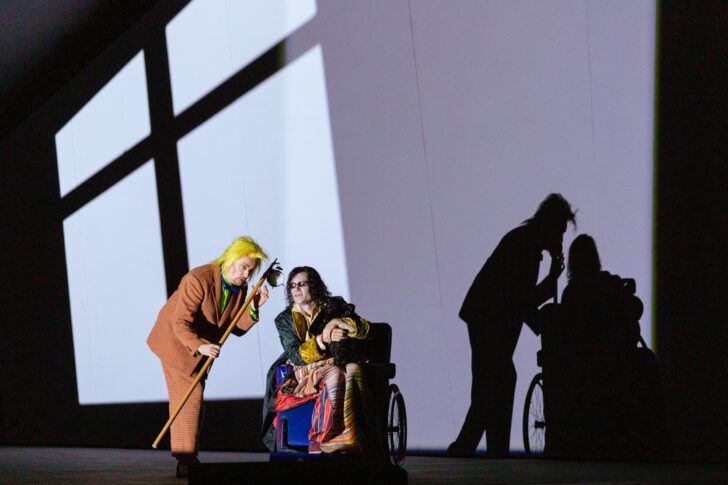
In the pit, it is Simone Young who conducts the Vienna Opera Orchestra: the orchestra has a real beauty of sound, with harsher tones than what we had heard at the Scala, the delicacies of a puppet perfectly disjointed in the situation here, which is all the more remarkable as the Vienna Philharmonic is currently on tour in Asia; but this great orchestral quality does not extend to the preparation of the singers, of whom only Hilary Summers, who was part of the original cast, worked directly with the composer. Of the three new ones, it is Georg Nigl (Clov) who does the best: with a Chaplinesque grace, he reveals himself to be perfectly in line with Fritsch's universe, even if the context maintains his interpretation in a superficiality which is not up to his usual creative power.
On the contrary, Philippe Sly appears too light in Hamm: Frode Olsen, the interpreter of the creation, was of absolute darkness, behind which the devastating humor only shone more. A humor that this second interpreter of the role brings to the fore, helped by Fritsch's acting direction which makes him a sort of disjointed puppet, as if we only saw the Guignol-style bust: it's progress from a visual point of view, and the foregrounding of humor is not a bad thing in itself, but in this case this humor would have to be the gateway to all the unspeakable depths of the character.
In the parental couple, Hilary Summers retains the benefit of the meticulous work carried out during creation with the composer, even if the direction restricts her a little; Charles Workman succeeds Leonardo Cortellazzi, whose disturbing youthful fantasy gave Nagg's character a singular presence and emotion in the parents' scene. Workman lacks this lightness and childish playfulness, which makes the scene much more banal.
The singers' main problem, however, is that they constantly seem to float, as if they had to move very cautiously on an uncertain orchestral substrate: for example, we lose a syllable here, a syllable there, as if we constantly had to compromises between the notes and the text and we cannot help but see the consequence of the overload of work which constitutes for Simone Young the replacement which she is carrying out at this very moment at La Scala for a Or du Rhin initially entrusted to Christian Thielemann.
The strangest thing about the evening, however, is its brevity: less than 100 minutes of music (so a good ten minutes less compared to the creation or compared to the concert version given at the Proms in 2023), without breaks between the stage, an option that differences in tempo do not seem to justify. This elimination of pauses, which seemed a little long to us at La Scala, leading here not to create continuity, but to make the different “Scenes and monologues” lose their individuality. The program gives no indication of the version used, except that Kurtág seems not to have given up on completing his setting of the piece to music: it is indeed to be hoped that the score will grow further rather than shrink in this way.
Photo credits: © Wiener Staatsoper / Sofia Vargaiová
(Visited 11 times, 10 visits today)
More details
Vienna. Staatsoper. 29-X-2024. György Kurtág (born 1926): Endgame, based on the play by Samuel Beckett. Direction, set and costumes: Herbert Fritsch. With Charles Workman (Nagg), Hilary Summers (Nell), Philippe Sly (Hamm), Georg Nigl (Clov). Vienna Opera Orchestra; direction: Simone Young.
Keywords of this article

